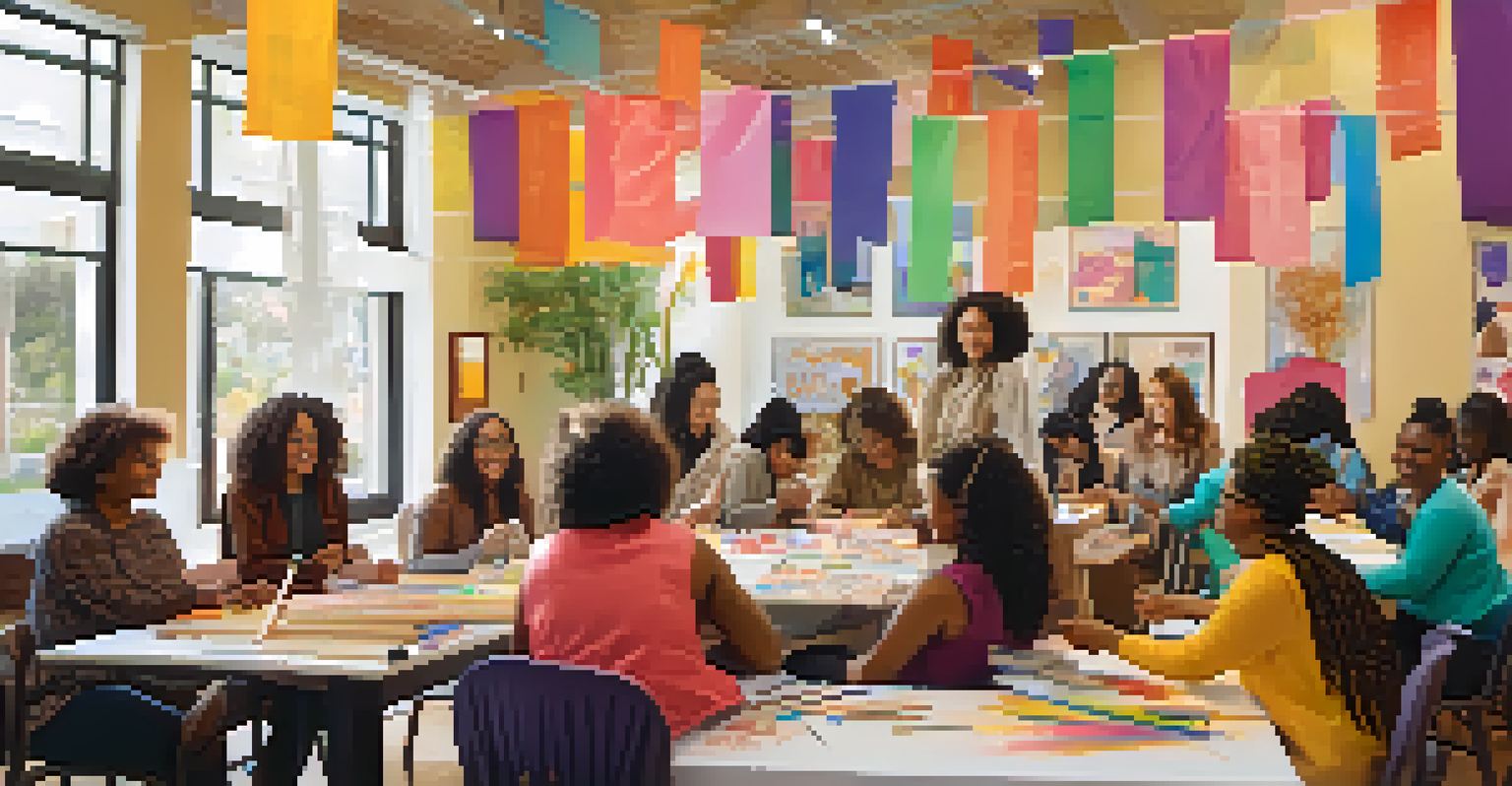Luxury Brands Empowering Women Through Philanthropy

The Rise of Philanthropy in Luxury Brands
In recent years, luxury brands have embraced philanthropy as a core part of their identity. This shift reflects a growing awareness that luxury is not just about opulence but also about responsibility and empowerment. By engaging in philanthropic endeavors, these brands are redefining what it means to be a leader in the fashion and luxury sectors.
Philanthropy is not about the money. It’s about using whatever resources you have at your fingertips and applying them to the betterment of the world.
Many luxury companies are now using their platforms to support causes that uplift women, from education to health initiatives. For instance, brands often collaborate with nonprofits to create awareness and drive change. This not only enhances their brand image but also resonates deeply with consumers who value social responsibility.
As a result, we see a new wave of luxury brands that prioritize giving back, aiming to inspire not just their customers but also their competitors. This commitment to philanthropy is shaping the future of the luxury market, making it more inclusive and socially aware.
Examples of Brands Leading the Charge
Several luxury brands have set remarkable examples in empowering women through their philanthropic efforts. For instance, Dior's 'We Should All Be Feminists' initiative not only promotes gender equality but also funds organizations that support women's rights. Such campaigns elevate the conversation around women's empowerment, making it a central theme in their marketing strategies.

Another notable example is Gucci’s partnership with Chime for Change, which focuses on education, health, and justice for women. This initiative not only raises funds but also brings global attention to issues affecting women, showing that luxury can drive meaningful change.
Luxury Brands Embrace Philanthropy
Many luxury brands are integrating philanthropy into their core identity, focusing on social responsibility and empowerment.
These examples highlight how luxury brands are using their influence to make a difference. By aligning their missions with social causes, they inspire consumers to partake in the dialogue around women’s empowerment, creating a community united for change.
Empowering Women Through Education Initiatives
Education is a powerful tool for empowerment, and many luxury brands are investing in this area. For instance, Louis Vuitton has funded educational programs aimed at helping young women gain skills for the workforce. Such initiatives not only elevate individual women but also contribute to broader societal change by fostering economic independence.
In a world where you can be anything, be kind.
By providing scholarships, mentorship programs, and resources for women, these brands are actively working to close the gender gap in various industries. This approach not only benefits the women directly involved but also enriches the communities they belong to, creating a ripple effect of empowerment.
Through these educational initiatives, luxury brands are sending a clear message that investing in women is essential for sustainable growth. This not only enhances their corporate image but also aligns their values with those of socially conscious consumers.
Health Initiatives: A Vital Component
Health programs are another significant area where luxury brands are making an impact. Brands like Estée Lauder have championed breast cancer awareness through initiatives that fund research and support women battling the disease. This not only raises awareness but also provides crucial resources for women in need.
By investing in health initiatives, luxury brands are addressing fundamental issues that affect women's lives. They are not just selling products; they are promoting well-being and advocating for women's health rights. This holistic approach enhances their brand image and fosters loyalty among consumers.
Education Initiatives Empower Women
Luxury brands are investing in educational programs for women, fostering economic independence and societal change.
Moreover, these initiatives reflect a commitment to tackling broader societal issues, positioning luxury brands as advocates for change. By focusing on women's health, they contribute to a culture of care and support, resonating deeply with their audience.
Supporting Women Entrepreneurs
Luxury brands are increasingly recognizing the importance of supporting women entrepreneurs. Initiatives like the 'Women in Business' program by Chanel provide funding and mentorship to female business owners. This commitment empowers women to take their ideas and turn them into viable businesses.
By investing in female entrepreneurship, these brands help create a more balanced economic landscape. This not only benefits individual women but also drives innovation and diversity in the market, showcasing the value women bring to various industries.
In doing so, luxury brands are not just building goodwill; they are also fostering a new generation of leaders. This support for women entrepreneurs reflects a broader understanding of empowerment that goes beyond philanthropy to include economic independence.
Collaborations with Nonprofits
Many luxury brands are forming partnerships with nonprofits to amplify their impact. Collaborations like those between Prada and UNICEF focus on providing education and resources to marginalized girls worldwide. These partnerships leverage the strengths of both organizations to create meaningful change.
By working with established nonprofits, luxury brands can reach a broader audience and ensure that their philanthropic efforts are impactful. This synergy allows them to tap into the expertise of organizations dedicated to women's empowerment, maximizing their contributions.
Collaborations Amplify Impact
Partnerships between luxury brands and nonprofits enhance their philanthropic efforts, creating meaningful change for women's empowerment.
These collaborations not only enhance brand credibility but also foster a sense of community among consumers. When customers see their favorite brands actively supporting causes they care about, it strengthens their connection to the brand and its values.
The Role of Social Media in Philanthropy
In the digital age, social media plays a crucial role in amplifying philanthropic efforts. Luxury brands are harnessing platforms like Instagram and Twitter to raise awareness for women's empowerment initiatives. This approach allows them to engage directly with consumers and share impactful stories.
Through compelling storytelling and visual content, brands can connect with their audience on a personal level. This not only raises awareness but also encourages consumers to participate in initiatives, whether through donations or advocacy.

Social media also creates a space for dialogue around women's issues, fostering a community of support and encouragement. As luxury brands leverage these platforms, they are not just promoting their products but also championing important causes that resonate with their audience.
The Future of Philanthropy in Luxury Brands
As we look to the future, the trend of luxury brands embracing philanthropy is likely to grow. With consumers increasingly prioritizing social responsibility, brands that invest in women's empowerment will stand out in a crowded market. This shift signals a change in consumer expectations, pushing brands to align their values with those of their customers.
Moreover, the impact of these philanthropic efforts will likely be measured more rigorously. Brands will need to demonstrate tangible results from their initiatives, creating transparency and accountability that consumers increasingly demand.
Ultimately, the future of philanthropy in luxury brands holds the promise of a more equitable world. By continuing to empower women through various initiatives, these brands can play a pivotal role in driving social change while also enhancing their brand identity.